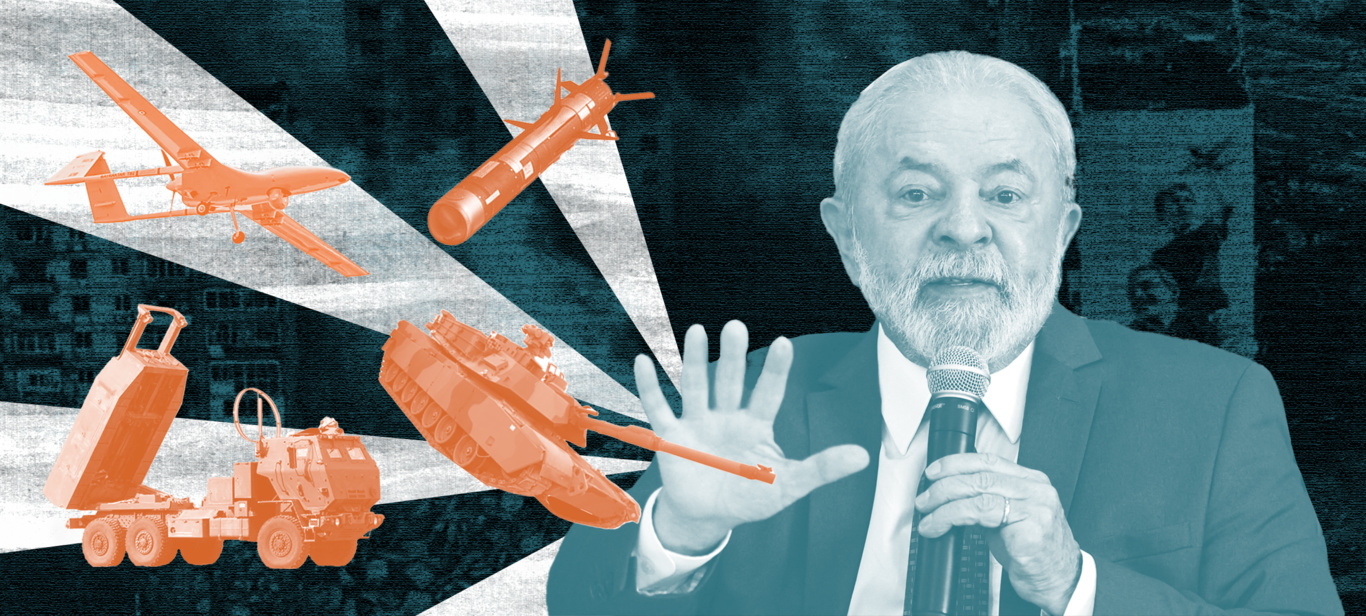As a result of Russia's full-scale invasion of Ukraine, the situation with food security has worsened around the world. Those countries on the periphery that are dependent on food imports from Ukraine and Russia, are now facing the threat of hunger. Food security is also affected by the global environmental crisis, which has unpredictable effects on agricultural performance. This all together reveals the connections between the war, environment, consumption and inequalities that the global capitalist commodity distribution system produces. These and other crisis processes are pushing for a way out of dependent relations and the formation of food sovereignty.
While analyzing the causes of the global food shortage, we inevitably raise questions regarding the right to own and use a land; the environmental impact of the food system; the development of production and distribution chains; consumption; and food pricing policies.
The participants of the Feuerbach 11 conference: Dialogues of the Peripheries, who are Natalia Mamonova, senior researcher at the Institute for Rural and Regional Research (RURALIS), Norway, Serge Harfouch, a farmer and activist from Lebanon, Andrew Bennie, a researcher at the Institute for Economic Justice, South Africa, and Fuad Abu Saif, a Palestinian human rights defender and general director of the Union of Agricultural Work Committees, shared their thoughts and gave analysis on related topics. The discussion was moderated by researcher and artist Iryna Zamuruieva.
‘Quiet’ food sovereignty of Ukraine on the background of the Russian-Ukrainian war
According to the definition of the international organization Via Campesina, food sovereignty is the right to healthy food that is in accordance with local culture and is grown in an ecologically sustainable manner, using independently chosen food and agricultural systems. In contrast to food security, which only refers to access to food, food sovereignty refers to the ability to produce and distribute food autonomously in order to provide food for the population. The notion of food sovereignty is rather new, but, at the same time, its implementation practices have a century-old tradition.
According to Natalia Mamonova, a researcher at the Institute for Rural and Regional Research, given the Russian-Ukrainian war, strengthening of Ukraine's food sovereignty is a crucial task. Thus, Natalia referred to studies that demonstrate that currently one in three households in Ukraine is food insecure, and this level is even higher in the east of the country.
In Ukraine, the food sovereignty discourse is underdeveloped. At the same time, over the decades, the country has been developing what the researcher calls a ‘quiet’ food sovereignty: since the period of the late Soviet Union, a lot of villagers and quite a few citizens have been providing for themselves through their own land lots. In times of crisis, this has helped to ensure that the country's minimum food supply is maintained. Natalia notes that:
‘Food self-sufficiency has a long history in Ukrainian society, yet its main feature is that the discussion around food self-sufficiency is not accompanied by a discussion about rights and a discussion about social mobilization on the subject of food. Ukrainians do not regard their food practices as a fundamental right, and they are not engaged in social movements around these issues. It is not seen as something special.’
Unfortunately, the events of Euromaidan and the Ukraine-EU Association Agreement did not lead to any reconsideration on the role of food sovereignty. This topic became even more sensitive after the beginning of the full-scale war with Russia and related major disruptions in the agricultural sector. Shelling and mining have damaged and destroyed much of the agricultural infrastructure and fields, affecting in particular large agricultural enterprises specialized in grain exports. At the same time, small-scale producers have been quick to adapt to the new conditions and reorient their food production to meet the needs of local families, communities and the military.

Consequences of a Russian UAV hitting a grain warehouse in a port on the Danube, Odesa region, August 16, 2023. Photo: Odesa OVA / Telegram
The Russian invasion in 2022 led to the rise of spontaneous mass solidarity, with people helping each other and raising crops on their own in both cities and villages. An alternative informal network was formed between food producers and consumers, thus meeting the most urgent needs of the affected population while supporting the operation of small-scale agricultural producers. For more information on this, see Natalia and her colleagues' research.
Victory Gardens and similar initiatives – based on Western movements during the two World Wars – help people to raise crops, but also to raise spirits and nurture hope for a brighter future. Such cases may signify the beginning of a more conscious movement for food sovereignty, which is in particular represented by the support of small farmers who feed the population with organic food. According to Natalia Mamonova, the small-scale agriculture plays nowadays a key role in Ukraine's food supply:
‘According to the pre-war studies, smallholding farms in Ukraine produced: approximately 95% of potatoes, 85% of vegetables, 85% of oil and berries, 75% of milk, and 35% of meat from the total amount of the country's production. Yet, the authorities often ignore the important part these smallholdings play in the country's food security, prioritizing large industrial export-oriented agricultural enterprises.’
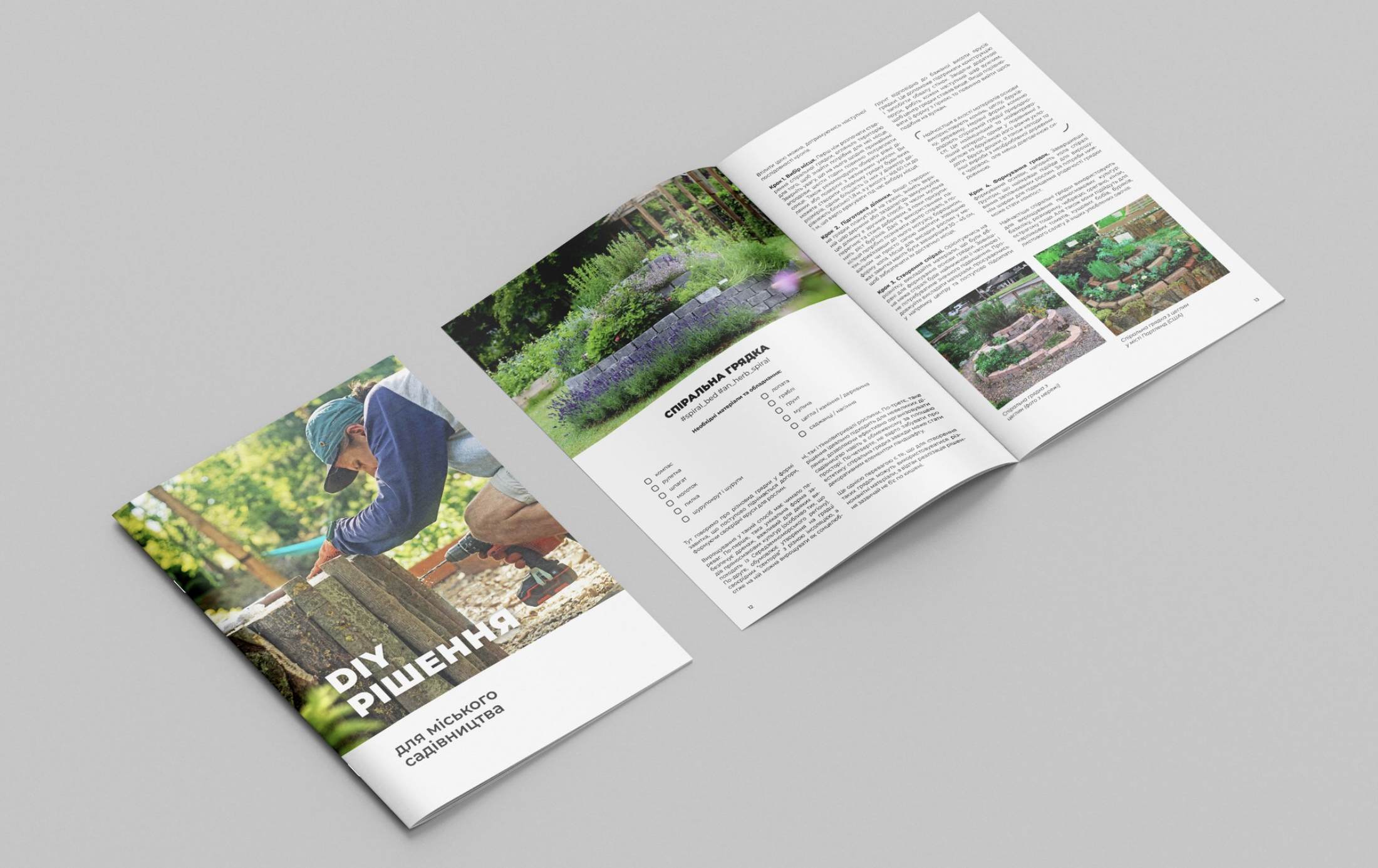
A collection of DIY ideas for the development of urban gardens and vegetable gardens, released in partnership with the Gardens of Victory initiative. Photo: Facebook Plato / Plato
It should be emphasized that one of the fundamental principles of food sovereignty in Ukraine is related to seed sovereignty. The full-scale war has shown that small producers often face a shortage of seeds. The seeds they receive from the companies that produce them are patented, meaning they are not suitable for reproduction, and therefore need to be purchased regularly. Monsanto is one of those large agricultural producers. Today, this company distributes seeds to farmers for free, but Mamonova believes this generous gesture is an attempt to expand the sphere of influence by ‘hooking’ more and more farmers in need with patented seeds. So, large international businesses are using the current moment to increase their influence and control over the market.
Overcoming import dependence through the return to traditional agricultural practices – the Lebanese experience
The processes that unfolded in Lebanon from the declaration of independence in 1943 until the 1970s may also be described as the establishment of a ‘quiet’ food sovereignty. During this period, the country was predominantly agricultural, with villagers providing food for themselves. The country's rapid industrialization and integration into the global economic system in the following years led to a situation, where the main facilities of agricultural production were concentrated in the hands of a few large export-oriented corporations and the oligarchic elite. As the country's population grew, Lebanon became increasingly dependent on food imports. According to Serge Harfouch, a Lebanese farmer-activist and co-founder of the farmers' initiative Our Seeds:
‘At a certain point, we were importing 90% of our food. For grain imports, we were very dependent on both Russia and Ukraine. Out of the 600,000 tones of grain consumed by the population annually, almost 80% came from abroad. So, the gap between the required production scale and our abilities to cover it ourselves was extremely huge.’
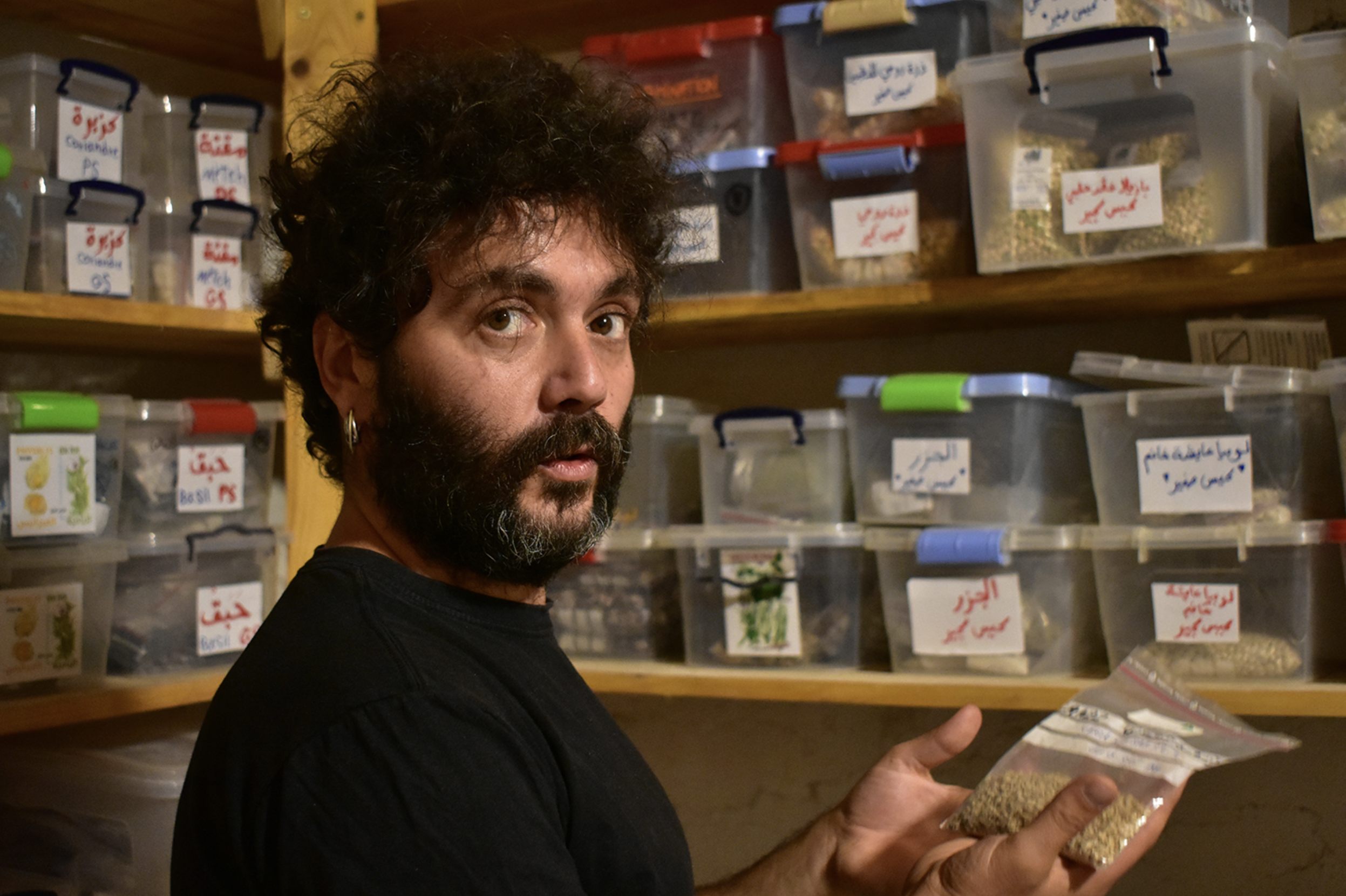
Serge Harfouch demonstrates a well-developed plant. Photo: Áine Donnellan for Mongabay
The situation started to change between 2019 and 2023, when the idea of food sovereignty was brought back in and even became mainstream. According to Serge, there were three main factors that played a decisive role in it.
Firstly, October 17, 2019 marked the beginning of a revolution in Lebanon. The society faced major challenges, involving the population at large to solve them. One of these challenges was the lack of food or lack of access to it.
Secondly, this period was characterized by an economic collapse and a devaluation of the national currency. Before 2019, one US dollar and one Euro were each worth about 1,500 Lebanese pounds, while today they are worth more than 90,000 pounds each. Currency devaluation has shown how dependent on imports the country is and how dependent on external factors its food security is.
Thirdly, the food security of the country is under threat because of the hybrid-oligarchic governance regime, where a few people control almost all sectors of the economy. Food imports, for example, are fully controlled by just one company. During times of instability, the owners of food firms took advantage of the situation to make money, overusing governmental subsidies and speculating on prices that affect the population.
All of the above demonstrated how important it is for a country to have at least basic food production in order to prevent the threat of famine in times of instability. Drawing attention to the concept of food sovereignty was linked inseparably to people's desire for autonomy and the ability to control their own future. The outbreak of the revolution showed that people's first priority was to get back control over their lives, and the second priority was to renew food production and food distribution.

Serge Harfouch. Photo: Áine Donnellan for Mongabay
For the establishment of Lebanon's food sovereignty, the access to the breeding seeds becomes more crucial than in the case of Ukraine. Similarly as in Ukraine, large agricultural holdings provide free patented seeds to farmers, and yet, later on, they offer farmers to buy the seeds themselves. As a result, large corporations begin to predominate in the market, while small producers are forced to pay for access to the means of production which is the seed itself. This applies not only to sterile plants, but also to the need for fertilizers, etc. All of these lead to a situation where small farmers become dependent on foreign currency and foreign production systems, and thus find themselves in a vicious circle. This creates a risk of getting into a situation where only a small piece of land near farmers' homes will save them from starvation.
Serge sees the first step to overcome these circumstances in creating an accessible stock of seeds containing endemic crop species. A further priority is to ensure that the population has access to information about sustainable farming methods and sustainable food production. Finally, it's crucial to have access to land and water.
In this context, founded in 2016 association Our Seeds (alternatively translated from Arabic as Our Roots) aims to bring back endemic species that used to grow in the region. Association was importing seeds from Iraq and distributing them to villagers, in order to avoid dependence on patents from large corporations. Over time, this initiative evolved and began to work on restoring traditional agro-ecological and seed production practices. Such an approach has helped to resolve numerous related problems, among which are soil degradation and pollution from pesticides and chemicals. To achieve food sovereignty, farmers need to have their own seeds, which they can grow on their own land; to be able to independently distribute and expand production, so that they could develop a full food production system. Serge Harfouch said it was one of the activists' central tasks to recover knowledge of traditional farming methods:
‘After the revolution, we realized that we needed to spread knowledge. It took literally only two or three generations to completely lose the ancient knowledge of how to cultivate the land and work with [endemic] crops. It was necessary to recover this knowledge and share it with people, and all this during a time of great chaos in society.’
The activists traveled around the country in search of villages where people kept the traditions of independent seeds production, sowing material production, and own food production. The gained knowledge was spread among the population in order to improve their ability to produce food on their own.

Serge Harfouch holds a plant in his hands. Photo: Áine Donnellan for Mongabay
Food sovereignty in South Africa: colonial legacy, climate crisis and other challenges
As the African continent is heavily dependent on the import of grain, the food crisis caused by Russia's blockade of Ukrainian ports has hit the region particularly hard. Andrew Bennie, a researcher of climate policy and economic justice systems in South Africa, emphasizes on the impact of the war in Ukraine on the threat of famine in Sub-Saharan Africa. However, according to the researcher, the main reason for the crisis is the structure of the global economy, in which African countries are embedded and which did not work in their favour even before the Russian-Ukrainian war.
The main goal of the global food trade system is to make a profit. As a result, any increase in global food prices makes it more difficult for African countries to import agricultural products, and thus could lead to potential hungers. African countries are forced to pay more for food, while countries such as the United States make additional profits from it. In other words, dependence on agricultural imports undermines the sovereignty of African countries and increases the chances of hunger. Why did it happen that African countries started importing a significant share of their agricultural products? As Andrew Bennie explains:
‘You need to understand that the food production system in African countries was created during colonial times. Therefore, when we say that African countries are 'underdeveloped', we have to keep in mind that this is because of colonialism.’
That is why the issue of food sovereignty and fair food distribution is more crucial than ever for many African countries. South Africa, for example, has a fairly developed and industrialized food production system, but due to the legacy of apartheid and colonialism, as well as the fact that the food industry is controlled by a few companies, a quarter of the country's population does not have free access to food. It is possible for South Africa to produce enough food to meet its domestic needs, but the majority of what it produces, is exported.
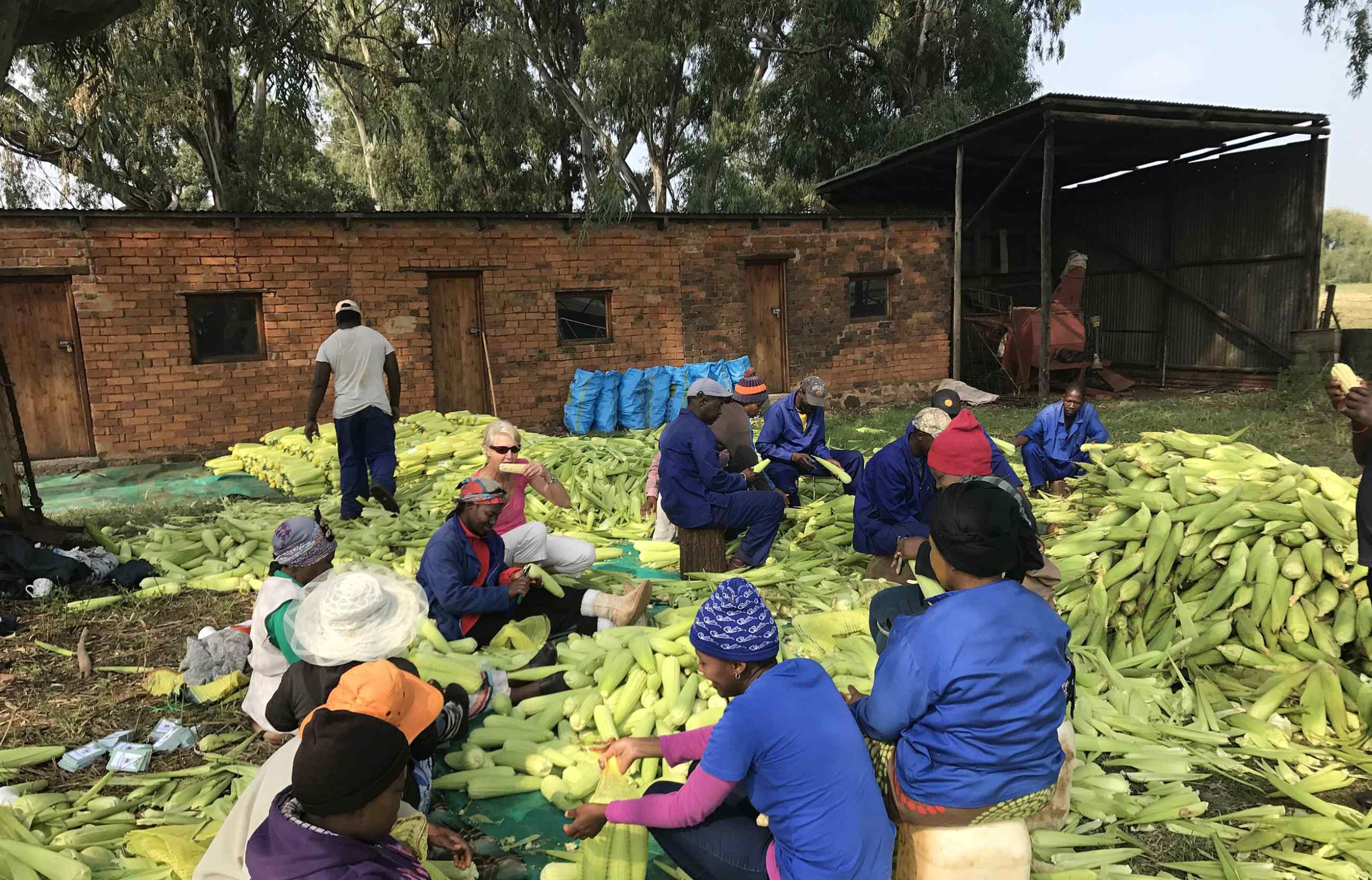
People of the African community clean corn from husk and bag it. Photo: Wikimedia
On the other hand, the land tenure system in South Africa is uneven and has a strong social class and racial character. The majority of farmers in the country are white, and they produce the majority of agricultural products. At the same time, 2.5 million black farmers have access to only 20% of water resources and are forced to cultivate a disproportionately small land area. As a result, the level of social inequality in the country is among the highest in the world. At the same time, the number of farmworkers involved in trade unions and other organizations in the country is at an all-time low, totaling only 27%, compared to 70% in the 1990s.
Environmental issues are also worth mentioning. According to the researcher:
‘South Africa's energy production is based on coal, which leads to significant impact on the climate. At the same time, Africa is, as a matter of fact, the center of climate change, suffering the most from it. In South Africa, for example, we are already experiencing an increase of 4°C, which has a very negative impact on people, animals and the environment in general.’
According to Andrew Bennie, to achieve food sovereignty and prevent an environmental crisis, it is crucial to deal with social justice issues. The government of South Africa is primarily interested in meeting the needs of the market when developing strategies for the ecological modernization of the agricultural sector, meaning that the government fails to take into account social structures, such as labour conditions, technical organization of work on farms, etc. Developing and improving connections between different participants of the production industry such as small farmers, workers, and consumers of agricultural products may be a promising way to resolve the food crisis. The involvement of the widest possible range of production process participants in social dialogue will help to agree on key aspects of the system transformation so that it benefits everyone.
The example of South Africa shows that the struggle for food sovereignty should be seen with a broader context: the struggle for social justice and equality.
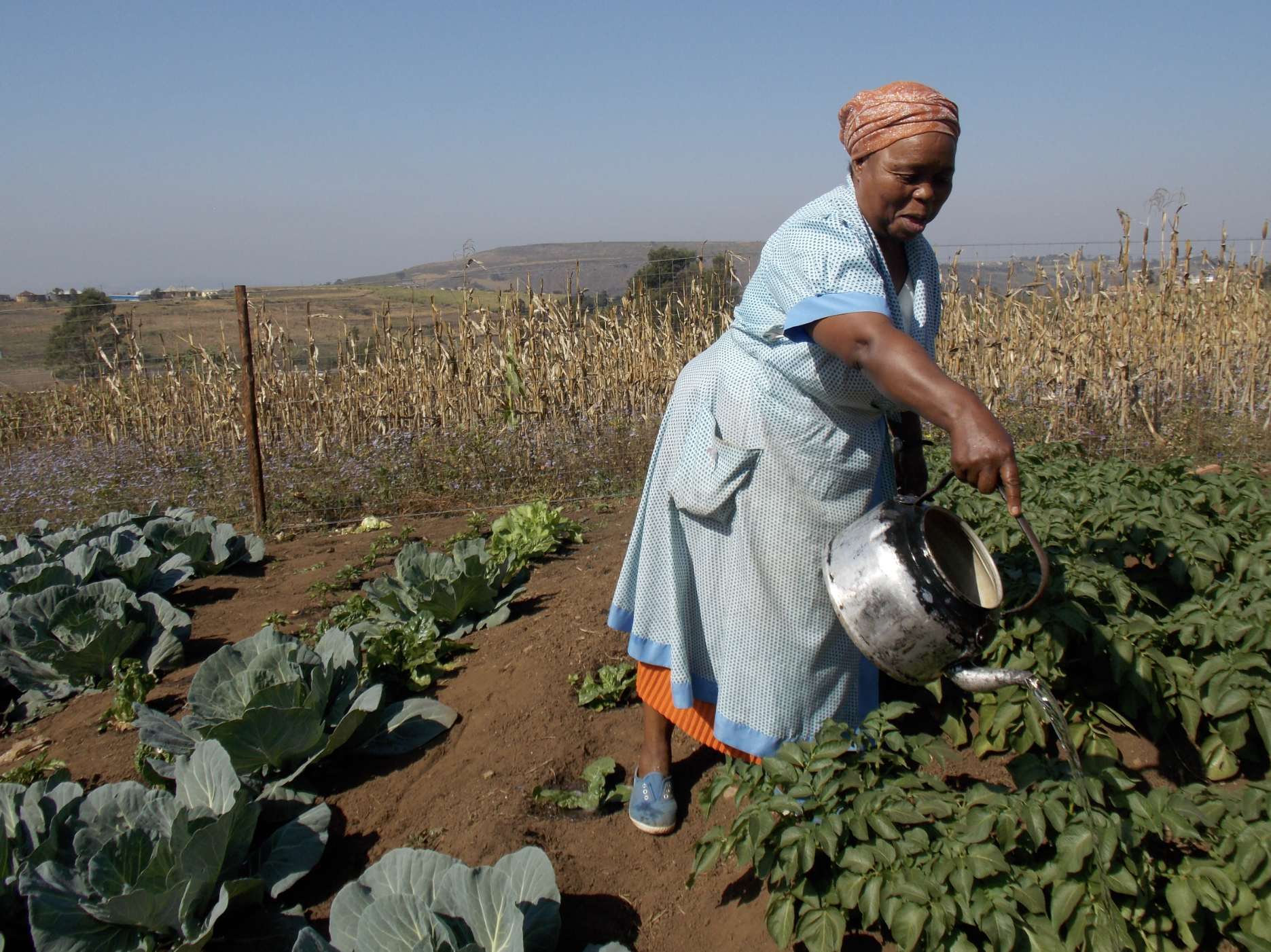
Lungeleni Sibiya grows native root crops in South Africa (Swayimana). Photo: adaptation-fund.org
The struggle for Palestinian food sovereignty as resistance to Israeli occupation
Palestinian human rights defender and director of the Union of Agricultural Work Committees (UAWC) Fuad Abu Saif spoke about the close connection between food security and sovereignty for Palestinians. For the Palestinians, achieving food sovereignty is akin to resisting the occupation, while food security is usually achieved through humanitarian aid from the outside.
The occupation, apartheid and de facto genocide of the Palestinian population by the Israeli authorities have led to a growing concern about Palestinians' access to food. Under the siege of the Gaza Strip, which has been ongoing for many years and has escalated into a full-scale conflict in the last months of 2023, not only food security but also the lives of millions of Palestinians are under constant threat. According to Fouad Abu Saif:
‘Women and children are under the bombing in the Gaza Strip, hospitals and homes are being targeted, and civilian infrastructure is being deliberately destroyed. The Israeli Defense Minister has officially stated that they have cut off the supply of water, electricity and food to the Gaza Strip, which means that the ban on using hunger as a weapon of war is being violated.’
Another of Israel's measures used to establish strict control over the Gaza Strip residents is to deny Palestinians access to agricultural land. Those Palestinians who live on the territories declared by Israel as a war zone, such as Gaza, do not have access to their land, the cultivation of which is prohibited. The destruction of food security is used as a tool of war: without access to food production, there is no way to fight against the occupiers.
However, the food situation in the West Bank is somewhat different from that in Gaza. The Palestinians living there have the opportunity to grow their own food, yet the Israeli authorities are trying to prevent this in any possible way. The authorities are setting up the settlements and checkpoints there, thereby restricting movement in the area. At the same time, there is a broad confiscation of the lands of the native population in favour of settlers.
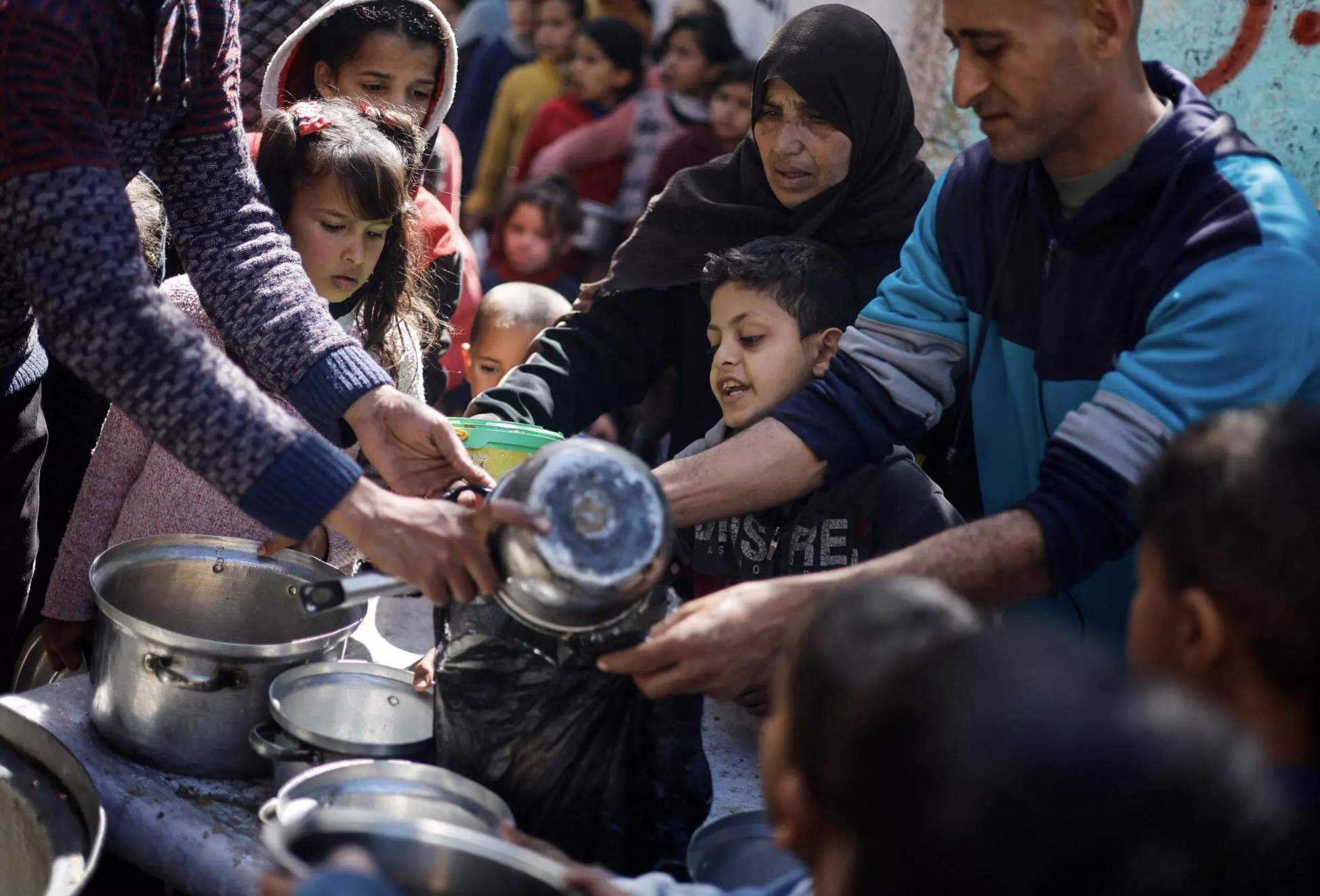
Palestinian children wait to receive food prepared by volunteers, southern Gaza Strip, March 5, 2024. Photo: Mohammed Salem / Reuters
Seed sovereignty is an important tool to counteract the deepening dependence on the occupation regime. According to the human rights defender:
‘Seeds are the basis of food sovereignty, so we should always take into account whether we can produce them ourselves. For example, in 2003, we saw the following situation in the West Bank: large agricultural companies that had links with Israel tried to buy out seeds from local farmers. These were seeds that were produced locally and were an important part of local agricultural traditions.’
In this context, one of the UAWC's priorities was to create a seed storage facility. Work that began back in 2010 resulted in the collection of several dozen varieties of crop seeds that are adapted to the Palestinian climate and suitable for cultivation in the region. These seeds are distributed to farmers so that they can use them in their regions, on their land lots.
Another way in which the Palestinian food system has adapted to the occupation regime is through people's use of home gardens and orchards. Though this practice is not enough to cover all food needs, it is an example of the grassroots movement that is contributing to the establishment of Palestinian food sovereignty.
Given the restrictions that the occupation authorities impose on access to water resources, Palestinians are trying to create a food production system that does not rely on irrigation. For this purpose, they use local seeds that are adapted to the dry climate, as well as construct mechanisms that can collect rainwater. However, due to climate change, the winter period is shifting, and the rainfall is decreasing. Therefore, even such fragile methods of water supply are becoming impossible.
Occupation and war, limited access to food and resources are the reality of Palestine. Establishing food security in such conditions becomes a priority, and building food sovereignty is a key to continuing resistance to the occupation regime. An important element of this struggle is a cooperative approach to agricultural production, to which Fouad Abu Saif also appeals. By using the limited resources that are available under occupation, cooperation allows creating supportive networks between people and organizing a more socially oriented production of agricultural goods.
****
When we talk about war, the environment, the right to food and the need for social justice, we must see these issues as mutually related. As the examples of Ukraine and Palestine clearly show, the issue of food sovereignty is also an issue of struggle against imperialist aggressions and is the key to resistance to occupation.
Activist movements in Lebanon and South Africa have shown that access to land and the ability to work on it are related to opposition to neoliberal politics, promotion of equality, and the struggle for environmental reforms and fair working conditions.
The struggle for healthy, culturally appropriate and environmentally friendly food is an integral part of the broader struggle for a more just, environmentally and socially oriented global system of production and distribution of resources. To achieve this goal, grassroots solidarity and local cooperation must be supported, along with the support of peoples' aspirations for liberation from colonial dependence, particularly through ensuring their food sovereignty.
Eating in crisis: food sovereignty, war and environment
Author: Valerii Petrov
Translation from Ukrainian: Anna-Maria Kotlyarova
Cover: Kateryna Gritseva



